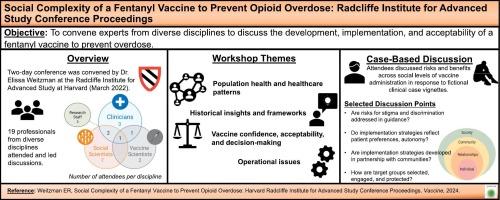预防阿片类药物过量的芬太尼疫苗的社会复杂性会议记录:拉德克里夫高级研究所会议记录。
IF 4.5
3区 医学
Q2 IMMUNOLOGY
引用次数: 0
摘要
自阿片类药物危机爆发以来,尽管公共卫生得到了极大的关注和投入,但仍有数十万人因阿片类药物过量而丧命。阿片类药物过量的风险因强效合成阿片类药物芬太尼涌入毒品供应而加剧。美国国立卫生研究院的 "长期帮助戒毒(HEAL)计划 "正在支持开发针对芬太尼的疫苗,以防止用药过量。如果研制成功,疫苗将诱导抗芬太尼抗体在血液中封存芬太尼(而非其他阿片类药物),防止芬太尼进入大脑并到达中枢神经系统,从而导致用药过量。引入一种依靠疫苗提供被动保护的预防用药过量策略可能会产生影响。然而,疫苗并不为公众所了解,而且被政治化了。此外,用药过量的生态系统非常复杂,横跨众多社会、经济、医疗和文化系统。因此,如果能从多学科角度考虑影响药物使用和用药过量的社会、伦理和系统性因素,并对芬太尼疫苗和相关实施策略的可接受性产生影响,就能优化使用疫苗策略来解决用药过量问题。2022 年 3 月,Elissa Weitzman 博士在哈佛大学拉德克利夫高级研究所召开了为期两天的会议,讨论芬太尼疫苗预防阿片类药物过量的社会复杂性。共有 19 位来自不同学科(医学、心理学、历史学、伦理学、免疫学、疫苗学、传播学、政策学)的专业人士参加了会议,并围绕人口健康和流行病学、医学史和药物使用理解框架、伦理学、决策和态度以及针对芬太尼过量的新型免疫疗法的操作问题展开了讨论。与会者还针对虚构的临床病例讨论了接种疫苗的风险和益处。会议发言和讨论摘要如下。本文章由计算机程序翻译,如有差异,请以英文原文为准。

Social complexity of a fentanyl vaccine to prevent opioid overdose conference proceedings: Radcliffe Institute for Advanced Study conference proceedings
Despite significant public health attention and investment, hundreds of thousands of individuals have suffered fatal opioid overdose since the onset of the opioid crisis. Risk of opioid overdose has been exacerbated by the influx of fentanyl, a powerful synthetic opioid, into the drug supply. The National Institutes of Health Helping End Addiction Long-term (HEAL) Initiative is supporting the development of vaccines targeting fentanyl to protect against overdose. If successful, a vaccine would induce anti-fentanyl antibodies to sequester fentanyl (but not other opioids) in the blood, preventing fentanyl from crossing into the brain and reaching the central nervous system where it can cause overdose. Introduction of an overdose preventing strategy that relies on a vaccine to confer passive protection may be impactful. However, vaccines are poorly understood by the public and politicized. Moreover, the overdose ecosystem is complex and extends across numerous social, economic, medical, and cultural systems. As such, optimal use of a vaccine strategy to address overdose may benefit from multidisciplinary consideration of the social, ethical, and systemic factors that influence substance use and overdose that may also impact the acceptability of a fentanyl vaccine and related implementation strategies.
In March 2022, Dr. Elissa Weitzman convened a two-day conference at the Harvard Radcliffe Institute for Advanced Study on the Social Complexity of a Fentanyl Vaccine to Prevent Opioid Overdose. In all, 19 professionals from diverse disciplines (medicine, psychology, history, ethics, immunology, vaccinology, communications, policy) attended the conference and led discussions that centered on population health and epidemiology, history of medicine and frameworks for understanding substance use, ethics, decision-making and attitudes, and operational issues to the question of a novel immunotherapy targeting fentanyl overdose. Participants also debated the risks and benefits of vaccine administration in response to fictional clinical case vignettes. A summary of the conference presentations and discussions follows.
求助全文
通过发布文献求助,成功后即可免费获取论文全文。
去求助
来源期刊

Vaccine
医学-免疫学
CiteScore
8.70
自引率
5.50%
发文量
992
审稿时长
131 days
期刊介绍:
Vaccine is unique in publishing the highest quality science across all disciplines relevant to the field of vaccinology - all original article submissions across basic and clinical research, vaccine manufacturing, history, public policy, behavioral science and ethics, social sciences, safety, and many other related areas are welcomed. The submission categories as given in the Guide for Authors indicate where we receive the most papers. Papers outside these major areas are also welcome and authors are encouraged to contact us with specific questions.
 求助内容:
求助内容: 应助结果提醒方式:
应助结果提醒方式:


